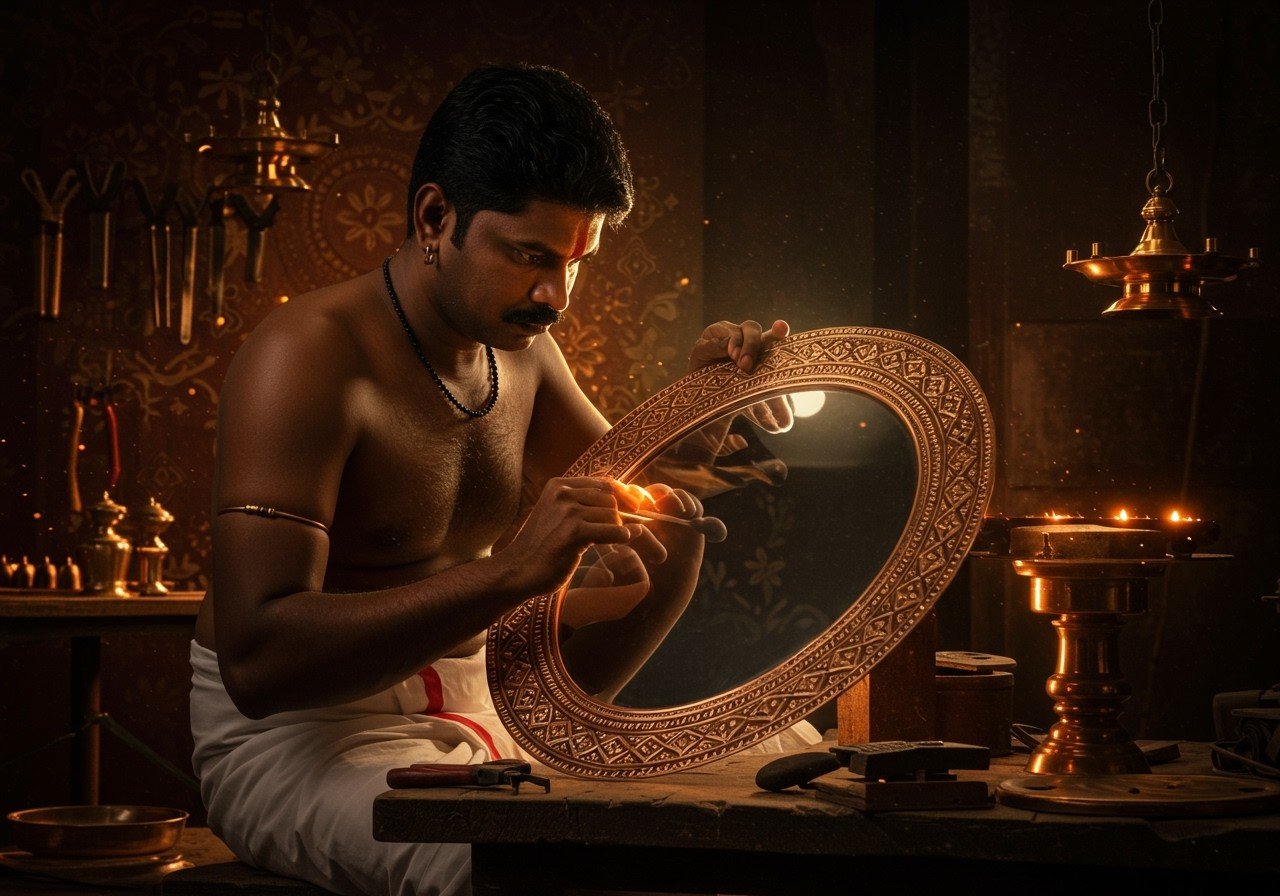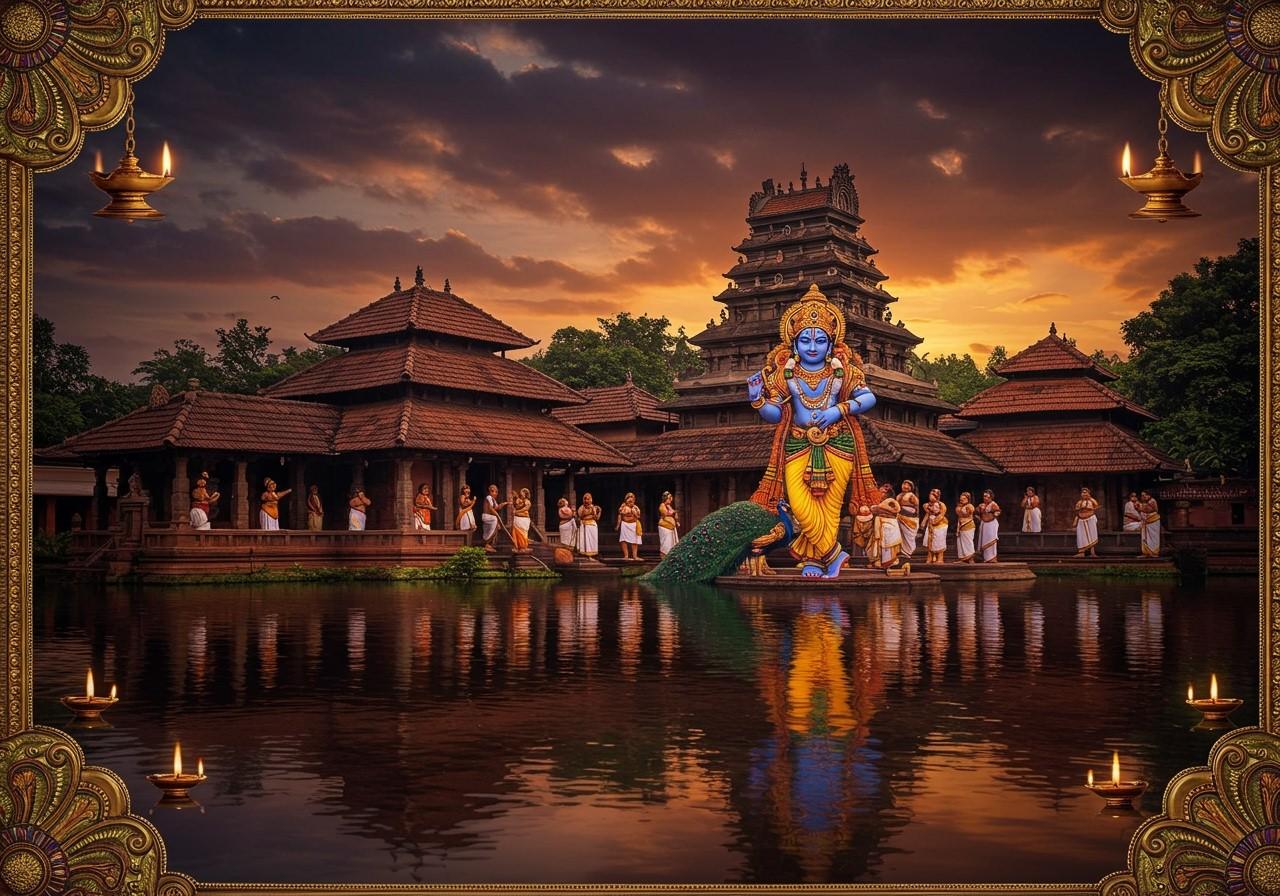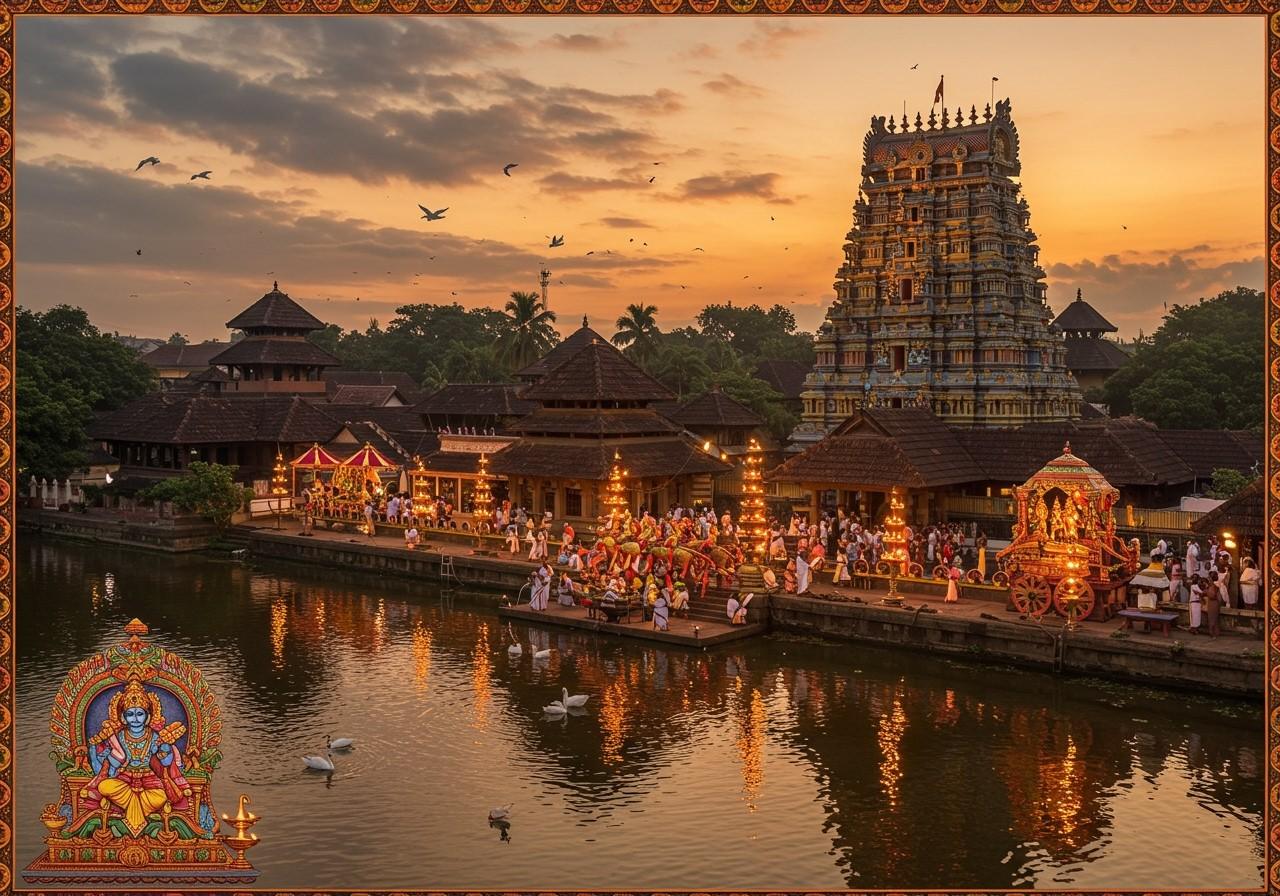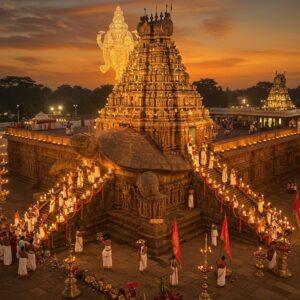
Embark on a journey to discover the Aranmula Kannadi, a cherished treasure from the heart of Kerala, India. More than just a mirror, it’s a testament to generations of skilled artisans, a symbol of prosperity, and a reflection of India’s rich cultural heritage. Unlike ordinary glass mirrors, the Aranmula Kannadi offers a unique, front-surface reflection, creating an unparalleled clarity.
A Glimpse into History
The story of Aranmula Kannadi is interwoven with the history of the sacred Aranmula Parthasarathy Temple. Royal patronage and the temple’s influence played a vital role in nurturing and preserving this ancient craft. The knowledge of creating these exceptional mirrors has been passed down through families, a closely guarded legacy. This unique heritage has earned the Aranmula Kannadi the prestigious Geographical Indication (GI) status, recognizing its cultural and economic significance.

The Art of Metal Mirror Making
Crafting an Aranmula Kannadi is a labor of love, a meticulous process involving a secret alloy formula. Each step, from alloy preparation to the final polish, demands precision and patience.
Alloy Preparation: The Foundation of Brilliance
- The heart of the Aranmula Kannadi lies in its unique metal alloy, primarily a blend of copper and tin, with the precise proportions remaining a closely guarded family secret. This secrecy adds to the mystique and allure of these mirrors. This special alloy gives the Kannadi it’s characteristic brilliance.
- The process begins with the careful selection of pure metals. Copper and tin are meticulously measured and combined in a crucible, a specialized container for melting metals. The mixture is then melted in a wrought iron crucible (kowa) sealed with clay, within an open-pit furnace fueled by charcoal and covered with “thondu” to retain heat.. The molten alloy is poured onto a flat surface to cool and solidify.
Mould Preparation: Shaping the Reflection
- The moulds, essential for giving the mirror its shape, are crafted from clay sourced from local paddy fields. This clay, refined and mixed to the right consistency, is shaped into slabs and left to dry under the sun. The slabs are then baked to harden them..
- To ensure a smooth finish, coal is meticulously rubbed onto the inner surfaces of the clay slabs. Two of these prepared slabs are then carefully placed together, facing each other, with a piece of wax creating the precise gap for the molten metal to be poured. The entire structure is then sealed with a clay mixture, ensuring no leakage during the casting process.
Casting: The Birth of the Mirror
- A clay cup is meticulously attached to the mould, creating an inlet for the molten metal. This cup also facilitates airflow during the heating process. The mould is then thoroughly dried and dusted to remove any impurities.
- Chunks of the prepared metal alloy are carefully placed within the mould, which is then covered and further sealed with a clay mixture. The entire assembly is placed in a furnace, heated to a precise temperature, until the metal within melts. The molten metal then flows into the cavity created by the wax, taking the shape of the mirror. After cooling, the mould is carefully broken to reveal the nascent mirror, ready for the next stage.
Polishing: Unveiling the True Reflection
- Polishing is where the true magic of the Aranmula Kannadi is revealed. This painstaking process, often taking one to two days, transforms the rough metal surface into a highly reflective mirror. Skilled artisans typically work on multiple mirrors at once, each requiring individual attention.
- A thick wooden block, shaped to match the mirror’s curvature, serves as the polishing base. Wax is applied to the block, and the pre-heated metal casting is affixed to it. As it cools, the wax hardens, creating a secure bond. Then, using cotton and velvet cloths along with specialized oils, the artisan patiently polishes the metal surface, coaxing out its inherent brilliance and reflectivity.
Finishing: A Frame of Elegance
Once polished to perfection, the mirror is carefully separated from the wooden block with heat. The final touch involves mounting the mirror on an intricately designed brass frame, adding a touch of traditional elegance.

The Guardians of Tradition
The artisans who craft Aranmula Kannadi are more than just craftsmen; they are the keepers of a centuries-old tradition. Often hailing from families with a long lineage in this art form, they dedicate their lives to mastering the intricate techniques passed down through generations.
A Symbol of Culture and Spirituality
Deeply rooted in Kerala’s cultural fabric, the Aranmula Kannadi is more than just a reflection; it’s a symbol of prosperity, good fortune, and spiritual insight. These mirrors grace auspicious occasions like weddings and festivals, adding a touch of tradition and blessing. They are often given as gifts, a gesture of goodwill and a wish for prosperity.
Poojn.in: Your Gateway to Authentic Ritual Items
At poojn.in, we understand the significance of having authentic and high-quality items for your rituals and ceremonies. Enhance your spiritual practices with our wide range of puja essentials. For instance, the Brass Mana is perfect for Lakshmi Puja, and the Metal Thali Set provides everything you need for a complete puja experience.
Aranmula Kannadi in the Modern World
In today’s digital age, the Aranmula Kannadi has found its place online, reaching admirers across the globe. It’s crucial to ensure authenticity when purchasing online. Poojn.in is committed to providing genuine Aranmula Kannadis, preserving the heritage and supporting the artisans who dedicate their lives to this craft.
What distinguishes Aranmula Kannadi? It is a unique metal mirror crafted in Aranmula, Kerala, unlike regular glass mirrors. Its creation involves a secret alloy of copper and tin, meticulously polished to create a flawless reflective surface. This process, handed down through generations of skilled artisans, makes each piece truly special and is believed to bring good luck and prosperity. The Aranmula Kannadi is more than just a mirror; it’s a cherished heirloom, reflecting the rich cultural heritage of Kerala. For your puja needs, consider the Jati Kapali Ghat or the Panch Ratna set available at poojn.in. Caring for your Aranmula Kannadi is simple: avoid water and clean with a soft cloth. Used in various Hindu rituals and ceremonies, the Aranmula Kannadi holds a special place in Kerala’s traditions. Crafting one can take several days to weeks, a testament to the artisans’ dedication.
Connect with poojn.in
Explore our diverse collection of spiritual and cultural products at www.poojn.in. For any queries, reach us at 03369029784 or WhatsApp us at 9476142738. We’re here to assist you on your spiritual journey.


